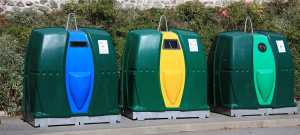
The Department of Solid Waste Management started serving the City of Spokane in 1940 with curbside service. Over the years it has developed into an impressive operation involving systems such as source separation, automated collection and computerized routing. In October of 1990, the City of Spokane Solid Waste Management Department, in compliance with Washington State Law and the Spokane Comprehensive Solid Waste Management Plan, started a curbside recycling program. Solid Waste Management provides 18 gallon blue bins to each residence for designated recyclable materials. This program services about 6,000 residents daily, and while it is optional, the number of Spokane residents taking part grows each year. Additionally, in the spring of 1992, Spokane started a commercial recycling collection program to provide service for multi-family dwelling units and businesses.
The overall goal of the city’s solid waste management program is to provide excellent multi-faceted collection, disposal and recycling services to its citizens at the least possible cost consistent with modern solid waste management practices. One way it is following through on its mission, as well as addressing environmental issues in order to protect the area’s natural resources, is partnering with Call2Recycle® to collect, recycle and dispose of rechargeable batteries.
The City of Spokane has been working with Call2Recycle since 2003. Before that, the department shipped the rechargeable batteries to a number of different companies, which was both time-consuming and expensive. Now, it utilizes Call2Recycle’s bulk shipping option, rather than box collection, so it ships the collected batteries twice yearly in 2000 lb. gaylords. The city provides curbside collection for 65,000 people in the area, accepts rechargeable batteries from small- quantity generators, like businesses that use a lot of batteries and those that make Call2Recycle’s on-site collection boxes available to their customers, and operates three transfer stations.
The battery sorting is accomplished through the city’s prison work release program. This, combined with the free shipping and recycling program provided by Call2Recycle, has meant a significant savings for the solid waste management budget in Spokane.
 Another way that Spokane has made the system more efficient is by improving the sorting and prep process for the batteries prior to shipping. The Department of Transportation requires that rechargeable batteries be taped on the “live” end or individually bagged prior to being transported, which can take a lot of time and effort. Kaiser was instrumental in developing a method of dipping each battery in a low-temperature solution that solidifies in seconds, before it’s packed in the drum. Collection bins are placed on a conveyor system set up at the main operations center. As the crew sorts the different battery chemistries, each battery is dipped in Evans Strip Coat, which the department buys in 40-pound lots from Evans Coating in Michigan, and melts in frying pans it picked up at Goodwill at the dipping station along the conveyor system.
Another way that Spokane has made the system more efficient is by improving the sorting and prep process for the batteries prior to shipping. The Department of Transportation requires that rechargeable batteries be taped on the “live” end or individually bagged prior to being transported, which can take a lot of time and effort. Kaiser was instrumental in developing a method of dipping each battery in a low-temperature solution that solidifies in seconds, before it’s packed in the drum. Collection bins are placed on a conveyor system set up at the main operations center. As the crew sorts the different battery chemistries, each battery is dipped in Evans Strip Coat, which the department buys in 40-pound lots from Evans Coating in Michigan, and melts in frying pans it picked up at Goodwill at the dipping station along the conveyor system.
“The time savings we achieve with the dipping method is just unbelievable,” said Kaiser, “which in turn saves us on labor costs. Also, with the strict regulations imposed by the Department of Transportation in prepping the batteries for shipment, this is an environmentally sound option and I would recommend the method to other municipalities.”
Another significant benefit to working with Call2Recycle has been the detailed reporting on collection totals and breakdowns that the Call2Recycle team can provide to the department. “We do coordinated prevention grants with the Department of Ecology,” said Kaiser, “and we need to track all kinds of information regarding our quarterly and yearly totals. Call2Recycle can give us valuable statistics and quantitative reports that greatly help in the planning and application process.”
Through the third quarter of 2011, Spokane has recycled 4.56 tons of rechargeable batteries with Call2Recycle. In 2010, Spokane recycled 9.14 tons of rechargeable batteries, close to double the amount they collected in 2009.
“Working with Call2Recycle has greatly improved the efficiency, both time- and cost-wise, of our rechargeable battery recycling efforts,” said Kaiser. “The bulk shipping option allows us to collect, sort, and ship as our staffing allows, and the reporting data helps us refine the program and plan in advance for the next year’s budget. The program makes it easier for our department because it offers everything we need in a partnership.”
View/Download Case Study (PDF)
Learn more about the City of Spokane, as part of our “Lessons from the Experts” Webinar Series
ShareNOV